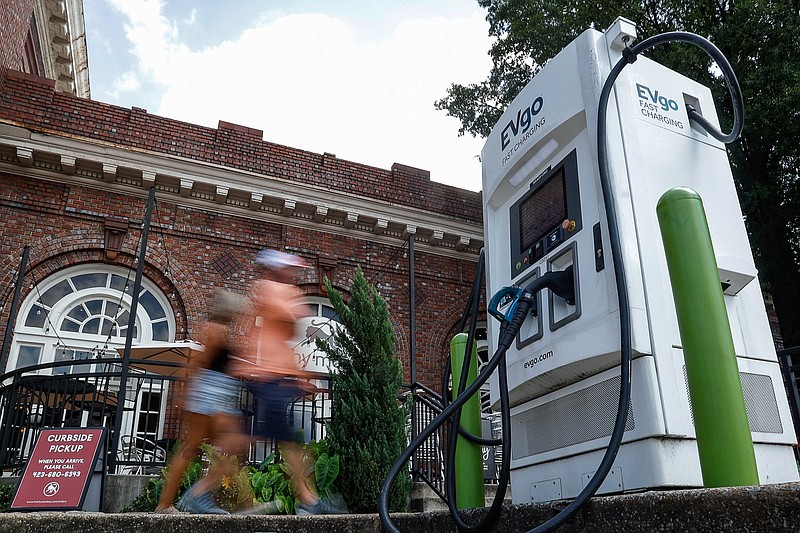Number of electric vehicles on Tennessee roads keeps rising
The number of registered electric vehicles rose in the fourth quarter by 1,669, or 10.9%, to 16,902 EVs, according to Atlas EV Hub's state EV registration data for Tennessee.
As of Dec. 31, 2021, there were 11,277 battery-electric vehicles and 5,625 plug-in hybrid electric vehicles. The Drive Electric campaign in Tennessee, backed by the Tennessee Valley Authority, is pushing to have at least 200,000 electric vehicles on Tennessee roads by 2028.
The counties with the most registered EVs in the state at the end of 2021 are still Williamson, Davidson, Shelby, Knox and Rutherford. Hamilton County's number, at 903, is growing quickly to match Rutherford County's, at 972.
Volkswagen's electric vehicle presence is growing in the state to overtake Honda for the 12th spot, according to Atlas EV Hub's data.
Over the past two years, the number of EVs on Tennessee roads has grown by nearly 75%, according to state vehicle registrations.
Kia recalls vehicles over airbag problems
Kia is recalling more than 410,000 vehicles in the U.S. to fix a problem that can stop airbags from inflating in a crash.
The recall covers certain Forte small cars from the 2017 and 2018 model years and Sedona minivans and Soul small SUVs from 2017 through 2019. The electric Soul also is included.
The Korean automaker says the airbag control computer cover can contact a memory chip and damage the electrical circuit. That could stop the airbags from inflating.
Dealers will inspect the computer and either update software or replace it. Owners will be notified by mail starting March 21.
Kia says in documents posted Friday by U.S. safety regulators that the problem surfaced in Korea last July. The company says it has 13 customer complaints and 947 warranty claims, but no crashes or injuries were reported.
EPA restores rules for power plants
In a reversal of a Trump-era action, the Environmental Protection Agency said Monday it will resume enforcement of a rule that limits power plant emissions of mercury and other hazardous pollutants.
The EPA action restores a rule imposed under President Barack Obama and continues a practice in which the Biden administration reinstates environmental protections loosened under President Donald Trump. The 2012 rule requires significant reductions in emissions of mercury, acid gases and other harmful pollutants, primarily by coal-fired power plants.
EPA said its actions would improve public health, including reducing the risk of heart attacks and cancer and avoiding neurodevelopmental delays in children.
"Sound science makes it clear that we need to limit mercury and toxins in the air to protect children and vulnerable communities from dangerous pollution," EPA Administrator Michael Regan said in a statement. "EPA is committed to aggressively reducing pollution from the power sector so that all people, regardless of ZIP code or amount of money in their pocket, can breathe clean air and live healthy and productive lives."
Chicago Public Media buys Sun-Times paper
The combination of two storied Chicago news brands has created one of the country's largest local nonprofit news organizations.
Chicago Public Media, which owns WBEZ, the local NPR affiliate, announced Monday it completed a deal to buy the Chicago Sun-Times, the punchy tabloid with roots that stretch back to the mid-19th century. Final terms were not disclosed.
The Sun-Times will be an independent subsidiary of Chicago Public Media, and the paper and the radio station will have separate newsrooms. But they will share content across their platforms and will combine to reach more than 2 million Chicago residents weekly via print, broadcast and digital platforms, Chicago Public Media said. And in an era when many local newsrooms have bled staff, particularly after mergers, the head of Chicago Public Media, Matt Moog, told WBEZ there will be 50 open positions at the two organizations, and they will be hiring.
Chicago Public Media said it raised $61 million for the deal, with funding coming from local foundations and individual donors via multi-year commitments. Most commitments are pledged over a five-year period, and the funds will be invested in the Sun-Times to expand its journalism, invest in its digital product and maintain the print paper, the company said.
- Compiled by Dave Flessner
